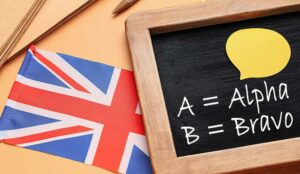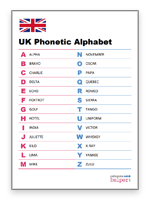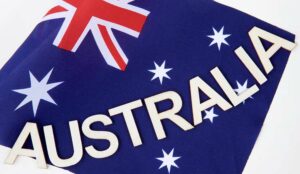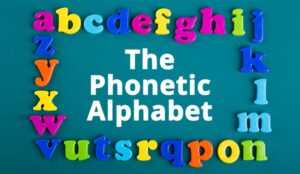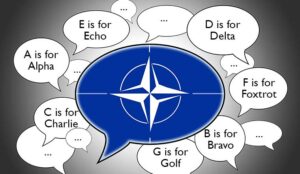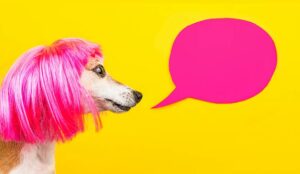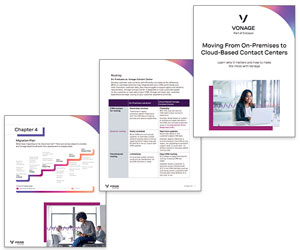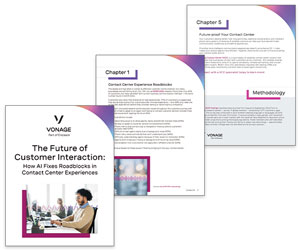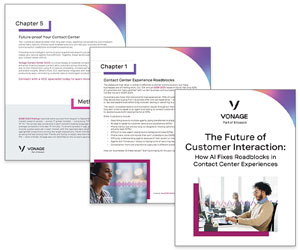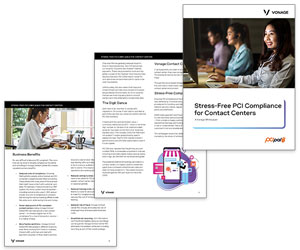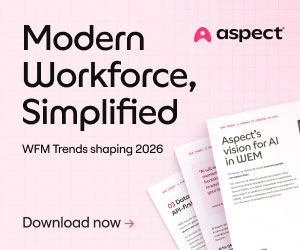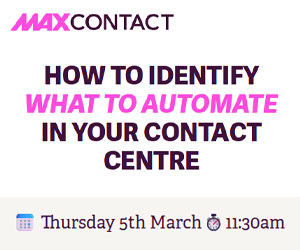What is the UK Phonetic Alphabet?
The UK Phonetic Alphabet is a system used to spell out letters clearly during verbal communication, especially over the phone. It prevents confusion between similar-sounding letters like “B” and “P” or “M” and “N.”
For example, without clarification, a postcode like “NP2 3BP” could easily be misheard as “MB2 3PP,” causing confusion. To avoid this, the UK phonetic alphabet assigns each letter a unique word, such as “N for November,” “P for Papa,” and “B for Bravo.”
The Standard Phonetic Alphabet used in the UK is the NATO Phonetic Alphabet
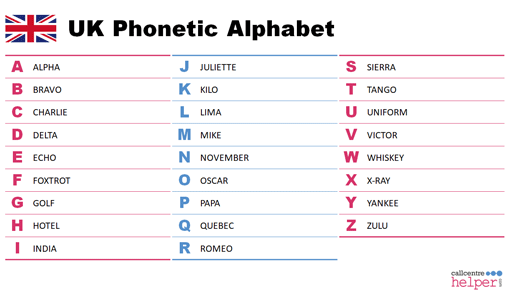
| Letter | Word | Phonic |
|---|---|---|
| A | Alpha | AL FAH |
| B | Bravo | BRAH VOH |
| C | Charlie | CHAR-LEE |
| D | Delta | DELL TAH |
| E | Echo | ECK OH |
| F | Foxtrot | FOKS TROT |
| G | Golf | GOLF |
| H | Hotel | HOH TELL |
| I | India | IN DEE AH |
| J | Juliette | JEW LEE ETT |
| K | Kilo | KEY LOH |
| L | Lima | LEE MAH |
| M | Mike | MIKE |
| N | November | NO VEM BER |
| O | Oscar | OSS CAH |
| P | Papa | PAH PAH |
| Q | Quebec | KEH BECK |
| R | Romeo | ROW ME OH |
| S | Sierra | SEE AIRRAH |
| T | Tango | TANG OH |
| U | Uniform | YOU NEE FORM |
| V | Victor | VIK TAH |
| W | Whiskey | WISS KEY |
| X | X-Ray | ECKS RAY |
| Y | Yankee | YANG KEY |
| Z | Zulu | ZOO LOO |
Printable UK Phonetic Alphabet
Do you want to download this to share with your team?
Get your free download of the UK Phonetic Alphabet now:
- Download Free UK Phonetic Alphabet in Editable Word Format
- Download Free UK Phonetic Alphabet in Editable PowerPoint Format
Easily Confused Spoken letters
In spoken English, certain letters can sound very similar to one another, leading to confusion, particularly in situations where clarity is essential, such as over the phone or radio. These letters often share similar sounds or rhythms, making them harder to distinguish without additional clarification.
Here are some examples of commonly confused letters:
- B, C, D, E, G, P, T and V
- M and N
- F, S and X
- Y and I
- G and J (particularly when pronounced by a non-native speaker)
The Modified UK Phonetic Alphabet
A lot of our readers pointed out that although the NATO alphabet works well if both people understand it, it is not so easily understood in a telephonic format as it uses less commonly used words such as “Sierra” or “Foxtrot”.
We have replaced the less common words and have produced a UK Phonetic Alphabet for Phone Calls. We have highlighted the words that have changed from the standard NATO version.
The UK Phonetic Alphabet for Phone Calls
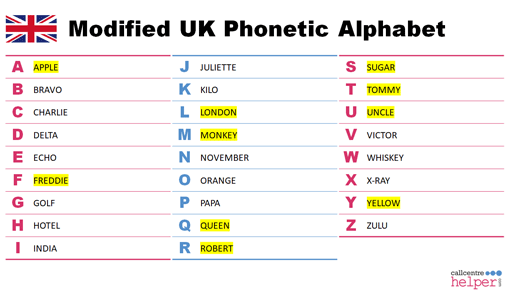
| Letter | Word |
|---|---|
| A | Apple |
| B | Bravo |
| C | Charlie |
| D | Delta |
| E | Echo |
| F | Freddie |
| G | Golf |
| H | Hotel |
| I | India |
| J | Juliette |
| K | Kilo |
| L | London |
| M | Monkey |
| N | November |
| O | Orange |
| P | Papa |
| Q | Queen |
| R | Robert |
| S | Sugar |
| T | Tommy |
| U | Uncle |
| V | Victor |
| W | Whiskey |
| X | X-Ray |
| Y | Yellow |
| Z | Zulu |
Free Printable Modified UK Phonetic Alphabet
Do you want to download this to share with your team?
- Free Modified UK Phonetic Alphabet Download in Printable PDF Format
- Free Modified UK Phonetic Alphabet Download in Editable Word Format
- Free Modified UK Phonetic Alphabet Download in Editable PowerPoint Format
Simplified UK Phonetic Alphabet
Victoria Williams, former Senior Professional Services Manager at Vonage, uses a different version of the phonetic alphabet and has shared her version with us:
| Simplified UK Phonetic Alphabet | ||
|---|---|---|
| A is for Apple | J is for Juliette | S is for Sunshine (or Sugar) |
| B is for Biscuit | K is for Kilo | T is for Tango |
| C is for Cat | L is for Lemon | U is for Umbrella |
| D is for Dog | M is for Monkey | V is for Victoria |
| E is for Elephant | N is for No One | W is for Whiskey |
| F is for Fish | O is for Orange | X is for X-Ray |
| G is for Gorilla | P is for Papa | Y is for Yesterday |
| H is for Happy | Q is for Queen | Z is for Zip |
| I is for Ice Cream | R is for Romeo | |
How is the Phonetic Alphabet Used in the Contact Centre?
We asked our readers how they used the phonetic alphabet in their contact centre. Here is what they said.
1. Used as Part of Induction Training
Way back when I used to be on the phones over 20 years ago, this was the normal practise at the company I worked at. We all used phonetic alphabet and it was formally part of the training. Customers understood it as a means to relay back spelling of names or alpha numeric references for confirmation.
Contributed by: Guy
2. Strong Correlation Between Net Promoter Scores (NPS) and the Phonetic Alphabet
I’ve just analysed 10,000 call transcripts for a major UK bank.
Use of the phonetic alphabet was not found once in any NPS Detractor conversations.
Conversely, 4.6% of all NPS promotors feature this behaviour. Of course, there’s far more going on than this, but the absence of this agent behaviour correlates highly with the worst customer NPS outcomes.
Contributed by: Andrew Moorhouse at Deloitte
3. Use A for Apple as Some Customers Struggle
I remember in my first agent role we used to have it on a printout stuck to the screen (retro!) following training.
I’ve always used a “simple” Phonetic – switched Alpha for Apple etc as some customers struggled.
So a Hybrid but still used!
Contributed by: Holly
4. It Helps Customers and Advisors Spell Correctly
Any teams I work with have to learn the phonetic alphabet! This might sound old-fashioned – however it helps customers and advisors to spell correctly – which is an absolute must!
Contributed by: Marianne Rutz
Which Industries Use the Phonetic Alphabet?
Wondering if the phonetic alphabet is right for your contact centre?
Whilst any contact centre regularly taking down information (such as addresses) will find the phonetic alphabet of use, you’re most likely to use the phonetic alphabet in the following industries:
- Finance or banking
- Insurance
- Real estate
- Travel or hospitality
- Medical / healthcare
5. Improves Quality and Reduces Errors
first thing they get trained in training when in a contact centre role. It’s a must, not only does it help with noting customers accounts and capturing accurate information, it helps with quality as reduces the amount of input error on systems and calls. An absolute must in my opinion.
Contributed by: Jennifer
6. Use S for Sugar
We always encourage people to check details and the phonetic alphabet is standard for that. We find customers hear C instead of S for Sierra, so S for Sugar tends to be the go-to.
Some of our clients get creative with it – the HP postcode could become Harry Potter for instance. It depends on who your customers are.
I have heard of “n” for Knickers on my travels, and that is the reason why we use the Phonetic Alphabet!
Contributed by: Diane Banister
7. Printed Sheets During Training

We used it all the time in the Ambulance service, it was never a problem to train and no one ever had an issue using it.
We printed a sheet that went in their personal folder when they started but to be fair after a week everyone knew it. I haven’t used it for many years but it seems to stay in your head. It is easily understood as the words are chosen so they can’t be misunderstood for a similar word.
If I said “B for Bear” you might hear “Bare, Care, Fair, Lair, Mare” whereas “B for Bravo” can’t be mistaken.
It is only critical in critical circumstances, where you have a call centre and mis hearing just takes longer to get a name or a postcode it is just a matter of time.
Contributed by: Robert Sykes
8. Use M for Muhammad in Islamic countries
I believe it’s the most historical reliable method. It’s easy to train, but you need to keep flexibility within cultural and custom preferences as it will be easier to implement it.
Such as the M letter could be “Muhammad in Islamic countries” or “Mike in western countries”
Customers do understand it easily.
Contributed by: Dani B. AtaAllah
9. Use Words the Customer Understands

I have always included the phonetic alphabet in the induction training.
I have emphasised that as long as you and the customer know which letter you are saying then it’s OK.
For example, O for orange is fine.
Contributed by: Kim Ellis
10. To Build Rapport Mirror the Customer
I’ve always taught my agents to use the phonetic alphabet but as a way to build rapport mirror the customer. For example, if the customer says S for Sugar, repeat that back rather than S for Sierra.
Contributed by: Jason
If you are looking for real information on, or printable versions of, the phonetic alphabet – we’ve got you covered, just check out these next:
- What Is the Phonetic Alphabet?
- NATO Phonetic Alphabet – Free Download
- French Phonetic Alphabet – Free Download
- Spanish Phonetic Alphabet – Free Download
- Comedy Phonetic Alphabet – Free Download
- Australian Phonetic Alphabet
Author: Jonty Pearce
Reviewed by: Hannah Swankie
Published On: 13th May 2022 - Last modified: 6th Jan 2026
Read more about - Skills, Call Handling, Editor's Picks, Free Downloads, Induction Training and Onboarding, Kim Ellis, Language, Phonetic Alphabet, Skill Development, Training and Coaching, Vonage





